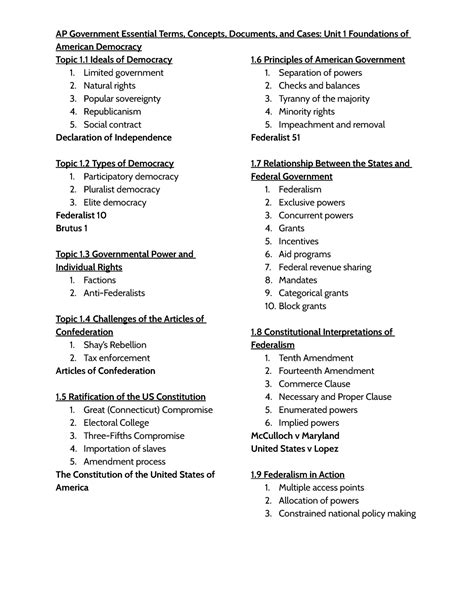Know these political philosophers and their ideas for a high-scoring AP Government exam:
Key Concept: Social ContractView of Human Nature: Selfish and competitiveIdeal Government: Absolute monarchy with sovereign authority to ensure orderFamous Quote: “Life in the state of nature is ‘solitary, poor, nasty, brutish, and short.'”
Key Concept: Natural RightsView of Human Nature: Rational and rights-bearingIdeal Government: Limited government with separation of powersFamous Quote: “Government is instituted for the good of mankind, and the preservation of property.”
Key Concept: General WillView of Human Nature: Basically good, but corrupted by societyIdeal Government: Direct democracy where the people rule as a wholeFamous Quote: “Man is born free, but he is everywhere in chains.”
Key Concept: Ideal StateView of Human Nature: Divided into three parts (reason, spirit, appetite)Ideal Government: Philosopher-kings ruling over a society based on justiceFamous Quote: “I am the Republic, which, as you believe, is but a word and a shadow.”
Key Concept: Virtue and the Good LifeView of Human Nature: Rational and political animalsIdeal Government: Mixed government with elements of monarchy, aristocracy, and democracyFamous Quote: “Man is by nature a political animal.”
Key Concept: Declaration of IndependenceView of Human Nature: Capable of self-governmentIdeal Government: Republicanism with limited powers and emphasis on individual rightsFamous Quote: “We hold these truths to be self-evident, that all men are created equal.”
Key Concept: Veil of IgnoranceView of Human Nature: Rational and self-interestedIdeal Government: Just society based on fairness and equalityFamous Quote: “No one has a claim to more than an equal part in society.”
Key Concept: Separation of PowersView of Human Nature: Prone to abuse of powerIdeal Government: Division of government into executive, legislative, and judicial branchesFamous Quote: “In order to prevent the abuse of power, it must be arranged so that one power checks the other.”
Key Concept: Women’s RightsView of Human Nature: Women are rational and deserve education and equalityIdeal Government: Government that respects the rights of all citizens, regardless of genderFamous Quote: “I do not wish them to have power over men; but over themselves.”
Key Concept: Human ActionView of Human Nature: Agents capable of independent thought and actionIdeal Government: Pluralistic society that fosters political participation and dialogueFamous Quote: “Action is the only activity that can create new things.”
Philosopher
Key Concept
Thomas Hobbes
Social Contract
John Locke
Natural Rights
Jean-Jacques Rousseau
General Will
Plato
Ideal State
Aristotle
Virtue and the Good Life
Thomas Jefferson
Declaration of Independence
John Rawls
Veil of Ignorance
Charles Montesquieu
Separation of Powers
Mary Wollstonecraft
Women’s Rights
Hannah Arendt
Human Action
Philosopher
View of Human Nature
Thomas Hobbes
Selfish and competitive
John Locke
Rational and rights-bearing
Jean-Jacques Rousseau
Basically good, but corrupted by society
Plato
Divided into three parts (reason, spirit, appetite)
Aristotle
Rational and political animals
Thomas Jefferson
Capable of self-government
John Rawls
Rational and self-interested
Charles Montesquieu
Prone to abuse of power
Mary Wollstonecraft
Women are rational and deserve education and equality
Hannah Arendt
Agents capable of independent thought and action
Philosopher
Ideal Government
Thomas Hobbes
Absolute monarchy with sovereign authority
John Locke
Limited government with separation of powers
Jean-Jacques Rousseau
Direct democracy where the people rule as a whole
Plato
Philosopher-kings ruling over a society based on justice
Aristotle
Mixed government with elements of monarchy, aristocracy, and democracy
Thomas Jefferson
Republicanism with limited powers and emphasis on individual rights
John Rawls
Just society based on fairness and equality
Charles Montesquieu
Division of government into executive, legislative, and judicial branches
Mary Wollstonecraft
Government that respects the rights of all citizens, regardless of gender
Hannah Arendt
Pluralistic society that fosters political participation and dialogue
Philosopher
Famous Quote
Thomas Hobbes
“Life in the state of nature is ‘solitary, poor, nasty, brutish, and short.'”
John Locke
“Government is instituted for the good of mankind, and the preservation of property.”
Jean-Jacques Rousseau
“Man is born free, but he is everywhere in chains.”
Plato
“I am the Republic, which, as you believe, is but a word and a shadow.”
Aristotle
“Man is by nature a political animal.”
Thomas Jefferson
“We hold these truths to be self-evident, that all men are created equal.”
John Rawls
“No one has a claim to more than an equal part in society.”
Charles Montesquieu
“In order to prevent the abuse of power, it must be arranged so that one power checks the other.”
Mary Wollstonecraft
“I do not wish them to have power over men; but over themselves.”
Hannah Arendt
“Action is the only activity that can create new things.”
Post navigation

